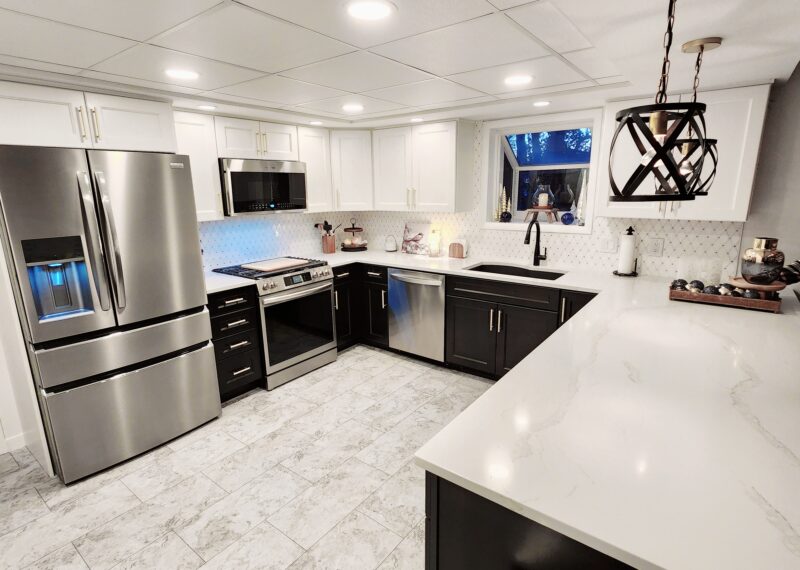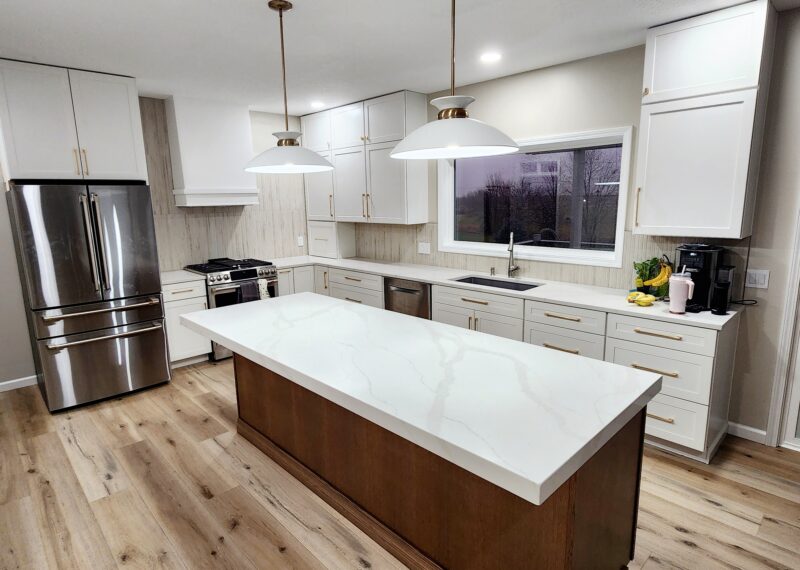TL;DR – Hiring the right basement remodeling contractor isn’t just about finding someone who knows how to swing a hammer. It’s about choosing a partner who understands moisture risks, city permitting, and how to transform a dark, underused space into something that actually adds value to your home. This guide breaks the process down step by step—from goal-setting to vetting contractors to knowing the red flags—so you can hire with confidence and avoid costly mistakes.
| Steps | What to Focus On |
| Step 1: Set Goals & Budget | Define your space’s purpose and build a realistic budget |
| Step 2: Find Candidates | Use local referrals, check licensing, and read reviews |
| Step 3: Vet Contractors | Review portfolios, verify experience, ask for references |
| Step 4: Ask Key Questions | Discuss permits, subs, timelines, contracts, and payments |
| Step 5: Compare Smart | Don’t chase the lowest bid—look for detail and transparency |
| Step 6: Communicate Clearly | Establish check-ins, track paperwork, and confirm the walk-through |
How to Hire a Basement Remodeling Contractor
Thinking about finishing your basement? Great move—but don’t let a smooth-talking contractor turn your renovation into a money pit. Knowing how to hire a basement remodeling contractor is more than just getting a few quotes. It’s about making informed decisions that protect your home, your wallet, and your peace of mind.
In this guide, we’ll walk you through the steps to find the right fit for your project—from identifying the right kind of contractor to asking the questions most homeowners forget. Whether you’re building a guest suite, home office, or entertainment zone, the right hire makes all the difference.

Why Choosing the Right Basement Renovation Contractor Matters
Hiring the wrong contractor doesn’t just lead to a few extra headaches—it can turn your basement into a costly liability. Basements aren’t like other rooms in your house. They come with their own unique challenges: potential moisture issues, code requirements for egress windows, insulation needs, and even the risk of mold if things aren’t done right. That’s why selecting a contractor who specializes in basement remodeling—not just general renovations—is critical.
Understanding Basement-Specific Challenges
A qualified basement renovation contractor will know how to:
- Address moisture control and drainage before any framing begins
- Ensure proper insulation and vapor barriers to keep the space livable
- Handle ventilation, lighting, and heating challenges often overlooked in below-grade areas
- Install egress windows where required by code for bedrooms or living areas
If your contractor isn’t asking questions about water intrusion or code compliance in your area, that’s a red flag.
Long-Term Value, Safety, and Code Compliance
Beyond the aesthetics, the right contractor safeguards your investment. A well-finished basement can add serious value to your home—but only if it’s done right. Cutting corners can mean:
- Failing a home inspection when you decide to sell
- Costly water damage or electrical issues down the road
- Delays, disputes, or even lawsuits if permits aren’t properly handled
Bottom line? Don’t just hire someone who can “make it look nice.” Hire someone who can make it last—and make it legal.
Step 1 – Define Your Project Goals & Budget
Before you even call a contractor, you need to be crystal clear on what you want out of your basement. A finished space that doesn’t meet your needs—or goes way over budget—isn’t a win. Contractors can only deliver on your vision if you’ve taken the time to define it first.
Project Vision: What Are You Really Building?
Start by asking yourself how you want to use the space. Is it:
- A guest suite with a full bathroom?
- A home office that’s quiet and comfortable?
- A rec room or home theater?
- A rentable unit to bring in income?
Each of these goals has different design, electrical, plumbing, and code implications. The more specific you are, the better your contractor can estimate and plan.
Budgeting With Realistic Numbers (and a Buffer)
Basement renovations often uncover hidden issues—old plumbing, minor water damage, or outdated electrical. That’s why it’s smart to:
- Research average costs for basement remodels in your area
- Get a ballpark range for your project type (e.g., full conversion vs. cosmetic update)
- Build in a contingency budget (10–20%) to cover surprises
When you go into your first contractor meeting with clear goals and a rough budget range, you send the message that you’re serious—and prepared.
Step 2 – Where to Find Qualified Contractors Locally
Once you know what you want, the next step is finding professionals who can actually deliver. And while Google searches and online ads might be a starting point, the best basement remodeling contractors usually earn their reputations offline.
Use Local Referrals, Review Sites, and Associations
Start by tapping into your own network:
- Ask neighbors, friends, or coworkers who’ve had basement work done—especially if you can see the results in person.
- Check online reviews on Google, Facebook, and niche sites like Houzz or Nextdoor—but don’t rely on star ratings alone. Read the details to see how the contractor handles problems.
- Look into local builder associations or remodeler directories. Many of the best local contractors aren’t dumping money into ads—they’re busy doing solid work and getting referrals.
Check Licensing, Insurance, and Local Reputation
In the Quad Cities area, legitimate basement contractors should be:
- Licensed to operate in both Iowa and Illinois (depending on your address)
- Insured, carrying both general liability and workers’ comp
- Known locally for their reliability—check with the Better Business Bureau or your city’s contractor registry for any red flags
Hiring someone unlicensed or uninsured could leave you financially responsible for any accidents or subpar work. Always ask for proof—and verify it.
Step 3 – Shortlisting & Vetting Pros
Finding names is easy—knowing who you can actually trust is the real challenge. Once you’ve gathered a list of potential basement contractors, it’s time to narrow it down to a few solid candidates worth bringing in for quotes and consultations.
Verify Basement Remodeling Experience
Not all contractors specialize in basements. You want someone who knows the specific risks and requirements that come with working below ground. Ask:
- “How many basement remodels have you completed in the past year?”
- “Do you handle all work in-house or subcontract key trades?”
- “Can I see before-and-after photos of recent basement jobs?”
If their portfolio is filled with kitchens and bathrooms—but no basements—you may want to keep looking.
Ask for References and Past Clients
Any contractor worth hiring should have references ready. Don’t be afraid to call them and ask:
- Were they easy to communicate with?
- Was the project completed on time and within budget?
- Did they follow through on all punch list items?
Bonus: If a past client lives nearby, they may even let you take a look at the finished space.
Check for Complaints or Code Violations
Finally, do a little digging:
- Look them up on the Better Business Bureau, your state licensing board, or local building department.
- Search for contractor lawsuits or complaints in your area.
- Ask your local building inspector if they’ve run into the company before—inspectors often have the inside scoop.
Step 4 – What to Ask in Consultations
Once you’ve narrowed your list down to a few trusted contractors, it’s time for consultations. This isn’t just a meet-and-greet—it’s your chance to ask smart, specific questions that reveal how they work, how they plan, and whether you can trust them with your home.
Ask About Their Basement-Specific Experience
Start with the basics:
- “How many basement remodels have you completed?”
- “What were the biggest challenges in those projects, and how did you solve them?”
- “Do you foresee any issues with my home’s layout or structure?”
Experienced contractors will answer with clarity and specifics. Vague answers are a red flag.
Clarify Who Handles Permits
Permits are non-negotiable in a basement remodel—especially when plumbing, electrical, or egress windows are involved. Ask:
- “Who pulls the necessary permits—you or me?”
- “How long does it typically take to get approval in this city?”
Contractors who shrug off permits should be cut from your list immediately.
Understand Their Subcontractor Network
Few contractors do everything in-house. That’s normal—but it’s important to ask:
- “Do you work with the same electricians, plumbers, and drywallers on each job?”
- “Who supervises subcontractors during the day?”
- “Are your subs licensed and insured?”
A trustworthy contractor takes full responsibility for their subs’ work.
Discuss Timeline and Payment Schedule
You need more than just a start date. Ask:
- “What’s the expected project timeline, week by week?”
- “How do you handle delays or change orders?”
- “What’s your payment schedule—milestones or flat dates?”
Avoid any contractor who demands a huge upfront payment or who can’t commit to clear phases.
Review the Contract Thoroughly
Before you sign anything:
- Read every line. Look for vague terms like “as needed” or “TBD.”
- Make sure it includes timeline, scope of work, materials, warranties, and payment structure.
- Ask about cancellation terms and what happens if something goes wrong.
Step 5 – Comparing Quotes & Avoiding Pitfalls
Once you’ve met with a few contractors, the bids start rolling in—but don’t assume the cheapest is your best bet. Comparing basement remodeling quotes is less about price and more about detail, clarity, and what’s not included.
Don’t Just Chase the Lowest Bid
A surprisingly low quote can feel like a win—until halfway through the job when the “extras” start stacking up. Ask yourself:
- Is this contractor cutting corners to win the job?
- Did they mention anything about waterproofing, insulation, or permits?
- Are materials and finishes clearly specified?
A vague quote often leads to budget-busting surprises later.
Make Sure the Breakdown Is Detailed
A strong quote should itemize everything, including:
- Labor (framing, drywall, finish carpentry)
- Materials (flooring, lighting, hardware, cabinetry)
- Subcontracted work (electrical, plumbing, HVAC if needed)
- Waterproofing and moisture control solutions
- Cleanup and waste removal
If a quote is just a single number or a short paragraph, ask for clarification in writing.
Ask About Warranty & Post-Completion Support
You’re not just buying construction—you’re investing in a warranty. Ask each contractor:
- “Do you offer a workmanship warranty?”
- “How long do you stand by your work?”
- “If something goes wrong in 6 months, who do I call?”
A confident contractor won’t dodge this question. If they hesitate, that tells you all you need to know.
Step 6 – Ensuring Smooth Communication & Documentation
Even the most experienced contractor can’t deliver a smooth basement remodel without clear communication. Misunderstandings about timelines, materials, or small changes can quickly spiral into delays and frustration. That’s why you need a plan—not just for construction, but for how you’ll communicate along the way.
Set Expectations for Updates and Check-Ins
Ask upfront:
- “Who will be my main point of contact during the project?”
- “How often will we check in—daily, weekly?”
- “What’s the best way to reach you if I have a question or concern?”
Whether it’s quick texts or formal weekly walk-throughs, set a rhythm that keeps you in the loop without micromanaging.
Keep Track of Contracts, Changes, and Permits
Basement remodels often include change orders—unexpected plumbing reroutes, upgraded finishes, or minor layout tweaks. Every change should be:
- Documented in writing
- Signed by both you and the contractor
- Accompanied by an updated timeline and cost estimate
Keep a physical or digital binder with:
- Your signed contract
- Payment receipts
- Permit approvals
- Change orders
- Contractor and subcontractor contact info
Conduct a Final Walkthrough Before Signing Off
Don’t skip this. Your contractor should walk through the entire finished space with you, checking:
- Electrical, plumbing, HVAC functionality
- Finish work like trim, paint, flooring
That everything matches the agreed scope
Create a punch list together, and don’t release final payment until all items are complete.

Local Trust Boosters: Why Wilson Residential Stands Out
If you’re in the Quad Cities and looking for a contractor you don’t have to babysit, Wilson Residential should be at the top of your list. Hiring a contractor is a big decision, but when you choose a local team with deep roots and decades of experience, you’re not just getting construction—you’re getting peace of mind.
Licensed, Insured, and Local Code Experts
The team is fully licensed and insured across both Illinois and Iowa. They handle the permitting process, understand local building codes inside and out, and coordinate subcontractors who are just as qualified and accountable.
When you work with Wilson Residential, you’re choosing a partner who’s already earned the trust of your neighbors.
Call for Your Basement Consultation Today
Ready to transform your basement into something you’ll actually use—and love? Whether you’re envisioning a cozy movie lounge, a home gym, or a fully equipped guest suite, Wilson Residential is here to make it happen—on time, on budget, and without the runaround.
Our team will walk you through every step, from design ideas to permits and final walkthroughs. No guesswork. No gimmicks. Just experienced craftsmanship you can trust.
Call Wilson Residential Today to Schedule Your Free Basement Remodeling Consultation
Let’s talk about your space, your goals, and how we can build something great together.
[Call Now →(309) 738-9108]



